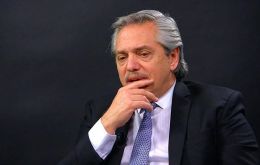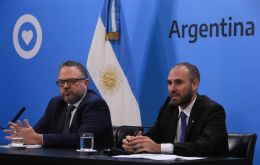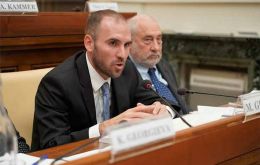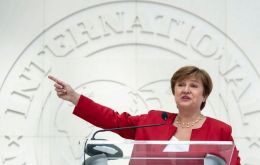MercoPress. South Atlantic News Agency
Tag: Martin Guzman
-
Friday, April 17th 2020 - 09:59 UTC
Argentina sets out its debt restructuring proposal to private creditors with a sizeable cut (62%) of interest payments

Argentina sketched out its debt restructuring proposal to international creditors on Thursday, involving a three-year grace period, large coupon cuts and a smaller reduction in capital, as it looks to win over bondholders to a deal.
-
Monday, April 6th 2020 - 08:50 UTC
Argentina postpones payments of bonds issued under local law, some US$ 10bn

Argentina is postponing payments on up to US$ 10 billion debt (interests and capital) that was issued under local law until the end of the year, the government said in a decree late on Sunday, in a bid to relieve pressure over looming foreign currency payments.
-
Friday, April 3rd 2020 - 07:59 UTC
Argentina continues talks but moves forward plans for debt restructuring

Argentina will continue talks this week and next with creditors over restructuring its US$ 83 billion in foreign debt, Economy Minister Martin Guzman said after the country missed the March 31 deadline it had set previously.
-
Tuesday, March 31st 2020 - 12:45 UTC
Argentina expected to make a symbolic US$ 225 million interest payment

Argentina will layout “guideposts” this week for a restructuring of its nearly US$70 billion in foreign debt, but the country is not yet ready to make a formal proposal to creditors, according to political sources in Buenos Aires.
-
Thursday, March 19th 2020 - 08:59 UTC
Coronavirus: Argentina unveils stimulus package; ample support from the political system to the strategy

Argentina unveiled this week a 700 billion Pesos (some US$10 billion) stimulus package to try to sustain economic activity, avert shortages of food and medical supplies, help companies and protect workers and vulnerable groups affected by the worsening Covid 19 pandemic.
-
Thursday, March 5th 2020 - 08:55 UTC
Representatives of Argentine sovereign bond holders meet with minister Guzman

Argentina’s minister of economy met with representatives of several major creditors, including asset management firm Pimco, a company executive and a ministry source said on Wednesday, as separate talks continued with the International Monetary Fund.
-
Tuesday, March 3rd 2020 - 08:30 UTC
Argentina hires Lazard, Bank of America and HSBC for debt restructuring process

Argentina’s government said on Sunday it had hired Lazard as financial advisor and Bank of America and HSBC as debt placement agents for the debt restructuring process it hopes to close by the end of March.
-
Friday, February 28th 2020 - 07:55 UTC
IMF mission arrives in Buenos Aires next Monday to continue negotiations

The International Monetary Fund will send another mission to Argentina to continue debt strategy talks and discuss “next steps,” IMF spokesman Gerry Rice said on Thursday, as the country seeks to renegotiate its US$ 57 billion financing package.
-
Thursday, February 27th 2020 - 08:15 UTC
The Challenges of Argentina’s Debt Renegotiation

By Jose Antonio Ocampo (*) – By affirming that Argentina's public-sector debt is unsustainable, the International Monetary Fund has taken a critical step toward resolving the country's long-running crisis. Moving forward, one hopes that the Fund will realize its own role in the latest crisis and follow its own advice on when to pursue capital-market liberalization.
-
Monday, February 24th 2020 - 07:59 UTC
Argentina will allow IMF to inspect its accounts under Article IV consultations

Argentina agreed to start consultations with the International Monetary Fund that could lead to a new financing program, days after the global lender said the country’s debt situation had become “unsustainable”.
